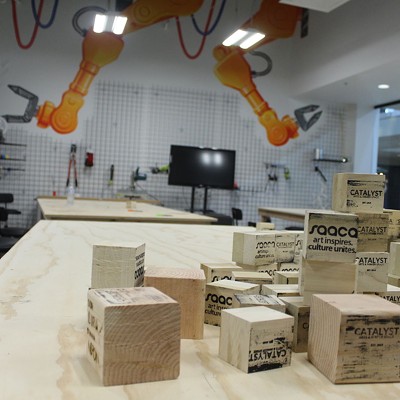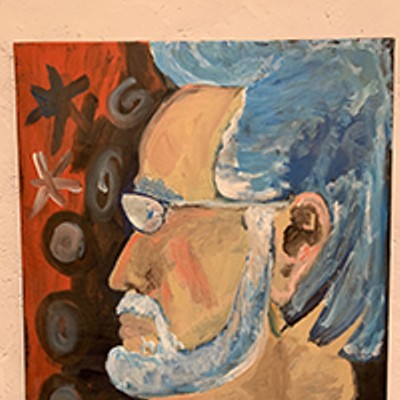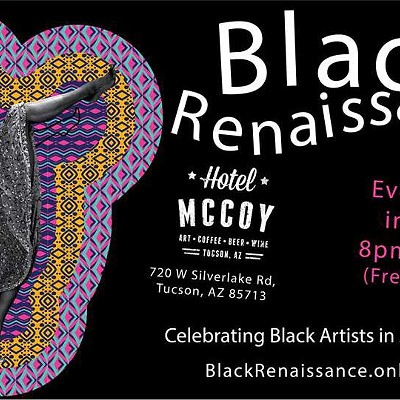Well, not exactly. But the four-day event does bring together poetry and painting, sometimes within the same creative individual.
Charles Alexander, head of the book-arts-oriented Chax Press and a mastermind of the POG poetry series, serves as guest artistic director for the event. He has a long association with the poetry festival, having been its director some 15 years ago and a featured poet at the festival in 2003.
Finding links between poetry and the visual arts wasn't Alexander's idea--that honor falls to Jami Macarty, the festival's former director--but he had no problem developing the theme.
"There certainly are moments in history when poets and painters connect so closely as to be one and the same person," he says. "I'm thinking of William Blake. And right around that time, you have visual artists like Turner kind of creating a new Romantic mood in painting at the same time Wordsworth and Coleridge were creating Romantic poetry, a lyrical sensibility that hadn't been present too much in the 17th and 18th centuries.
"Then, in the middle of the 20th century, you've got the new American poets like Robert Creeley doing all kinds of experimentation with language and how it can disrupt narrative but still be understandable as an act in language, and these experiments are parallel to what the Abstract Expressionists were doing in painting--breaking through representational art to another way of painting.
"I think of painting and poetry as different but related ways of approaching the world, of registering the world and registering the act of being in that world."
Says Teresa Driver, the festival's official new director, "I'm reminded of a number of paintings that have words embedded in them. There was a painter who bought a poem from a friend of mine at a silent auction and embedded the physical copy of the poem in a painting. So painters use words in their painting, and there are so many workshops about being inspired by paintings as a poet.
"All creativity springs from the same place; it's just that when some people have that welling up inside of them, they grab a brush; others grab a pen, and what comes out is a different translation of the same creativity. It's a different language expressing the same thing."
Most of the featured poets participating in this year's festival have collaborated in some way with painters in the past, and two of them paint as well as write.
This year's multifaceted festival revolves around 30- to 40-minute readings by the featured poets, but there will also be panel discussions, workshops and images (mostly work by Tucson-area artists) projected in conjunction with the events. "Not during the readings, because that would be a little distracting," says Alexander. The visuals will show up during breaks and introductions.
Here's how the schedule looks so far:
· Thursday, Oct. 6, 7 p.m.: Readings by participants in ArtsReach, a program for Southern Arizona's Native American students, and Marlon Evans (winner of the Ocotillo Literary Endeavors Residency at Hotel Congress). This will be followed by an open mic for local poets hosted by Liza Porter, coordinator of the Other Voices Reading Series. Local painters will be on hand to paint their responses to the poems. Admission is free.
· Friday, Oct. 7, 8 p.m.: Readings by Will Alexander and Heather Nagami. Alexander, based in Los Angeles, is both a painter and a poet. Says Charles Alexander, "Will Alexander has read for POG in the past, paired with (Tucson artist) Jim Waid in what was truly a cosmologically visionary evening. His work, springing from such writing influences as Aimé Césaire, and participating in a visionary black art tradition that includes such musicians as Sun Ra, never fails to amaze me, spin me, thrill me, every time I read a page, a poem, a book."
Nagami got her MFA from the UA three years ago and promptly moved away, but Charles Alexander developed an interest in her work that persists to this day. In fact, his Chax Press is publishing her first book, Hostile. Like Will Alexander, Nagami is a painter as well as a poet.
· Saturday Oct. 8, 8 p.m.: Readings by Kathleen Fraser, Patrick Pritchett and the winner of the 22nd annual Statewide Poetry Contest's Will Inman Award.
Fraser is the veteran in this group. Says Alexander, "Her book of essays, Translating the Unspeakable, published a couple of years ago, is one of the great works about poetry of the last several decades. Her selected poems, titled Il Cuore: The Heart, is a book we all should have, read, and re-read. All of our lives in poetry would be less without the work of Kathleen Fraser. I once wrote that I thought her work is sometimes misunderstood, because readers are carried away first by its beauty, something that can be difficult to look beyond, but more recently, I have been thinking that it is not so much beauty per se, but a compassion that allows the beauty to emanate from her work. Her compassion spreads to include all of us."
Pritchett lives in Boulder and teaches at the University of Colorado. Chax Press has just brought out his latest volume, Burn: Doxology for Joan of Arc.
· Sunday, Oct. 9, 3 p.m.: Readings by Tenney Nathanson and David Shapiro. Nathanson, who teaches at the UA and co-founded POG with Alexander, also has a new Chax Press volume on the shelf, Erased Art. Shapiro has long toiled as part of the New York School of poets. He has written more than 20 volumes of poetry and prose, including the first book on John Ashbery, the first book on Jim Dine's paintings, the first book on Jasper Johns' drawings and the first study of Piet Mondrian's flower studies.
"When I read his work (and I've been reading it a lot lately)," says Alexander, "it's such a rare combination of wit and compassion that it pleases me, puzzles me, makes me laugh and makes me feel more at home in the world, as strange as that world may be."
Besides all this, there will be daytime events on Saturday and Sunday, including a free panel discussion with the guest poets and painters (2-4 p.m. Saturday), and a number of small-group sessions.
Nagami's is called "Drawing on Language," and promises to "explore alternate possibilities of expression and creation through a combination of writing and drawing. This session is for anyone who has ever felt uneasy about the gap between what's inside our heads and what comes out of our mouths and pens."
Pritchett promised Alexander, "I plan to do something on ekphrasis--the verbal representation of a pictorial image. Workshop participants are asked to bring a photo or image that they will use as the basis for making a poem. In addition, we will read classic examples of ekphrasis that will serve as templates, from Auden to Cole Swensen."
Shapiro, in his session, plans to "discuss the relations of art, poetry and architecture. Having been trained as a violinist, he is particularly interested in the musicality of repetition in all the arts. He will draw on theory and very practical examples. He will discuss student work that will flow from paintings or drawings, some made in class. He will answer questions on modern and contemporary artists with whom he has collaborated, such as Johns, Hejduk, Keith Haring. The poet will welcome all to his class, including any local artists or musicians."
Artists Josh Goldberg and Katherine Josten, founder of the Global Art Project for Peace, will also take significant roles in the festival. Josten has merged her poetry and her paintings in a large installation titled Origins that was first exhibited in Tucson at the University of Arizona Museum of Art.
One of the small-group sessions will be held at Dinnerware Contemporary Art Gallery, 101 W. Sixth St., at 11:30 a.m. on Saturday. Sarah Hardesty will offer a tour of the gallery and its current exhibition, featuring works by many of Tucson's most accomplished visual artists. One or more of those artists will also be there to talk about painting and poetry.
The other events will be held at the Historic YWCA at 738 N. Fifth Ave. (at the corner of University Boulevard). At the door, readings cost $10 each; $15 weekend passes may still be available. Half-price student tickets are available with valid ID. Small group sessions cost $5 each.
Up-to-date info is available at 620-2045 and www.tucsonpoetryfestival.org.











